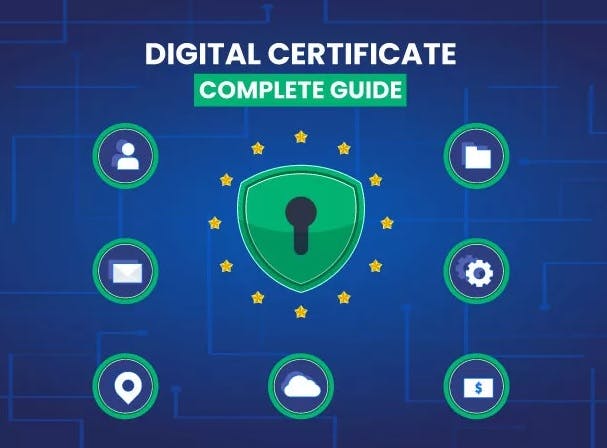What are Digital Certificates in Cyber Security?

In this digital and techy business world, digital certificates have become one of the crucial security components for any business since they are known to secure software, apps, websites, and networks from any cyber threat or vulnerability, and using digital certificates reduces the probability of a potential cyber-attack. As we are aware of the presence of digital certificates in business, let us move further to understand the fundamentals of digital certificates and their different types that are widely used by businesses to enable strong IT security infrastructure.
Fundamental Overview of Digital Certificates
A Digital Certificate is a logical file that helps organizations or individuals build the digital authenticity and legitimacy of themselves, their software, website, server, and device using “Encryption” and “Public Key Infrastructure(PKI)” mechanisms and is issued by Certificate Authorities(CA). Also, all operating systems, browsers, and digital platforms trust the certificate authority and all the certificates issued by such a CA, which enables the system to authenticate your identity as a legitimate publisher.
Additionally, digital certificates are also known as identity certificates or public key certificates since they hold some information about the user, such as:
Name of Certificate Holder
Serial Number of Device or IP Address
Original Copy of Public Key
Issue and Expiration Date of Certificate
Root and Intermediate CA details
Address of Organization
These details vary as per the type of certificate and the purpose for which it is issued. Digital certificates are of various types, but let us know about three major types of digital security certificates that are used by businesses for unique security purposes.
What are the Types of Digital Certificates?
Code Signing Certificates
Code Signing Certificates are digital certificates that work on the principles of Hashing, Encryption, and Public Key Infrastructure with the primary purpose of securing the code of any software, application, or EXE file, making it tamper-proof from any unauthorized malware or threat when they are digitally signed by the publisher or software developer.
Moreover, these certificates are also known to validate the publisher’s or developer’s identity as a trusted source by removing the "Unknown Publisher Warning” to users and stating that software, a file, or an app is safe for download, thereby enhancing the developer's or publishing entity's market reputation.
Code Signing Certificates are available in different types and are issued by reputed CAs like Comodo or Sectigo, depending on the validation, user requirements, and development platforms.
Individual Code Signing Certificate: As the name implies, Individual Code Signing (IV) certificates are suitable for individual developers to enable security for their software and apps and validate their identity as legitimate solo developers. A simple validation process is required to get IV certificates issued by the CA.
Standard Code Signing Certificate: Standard Code Signing, also referred to as Organization Validation (OV) code signing certificates, are issued to small or medium-sized software publishing organizations, which provides them with more-or-less the same level of security benefits as IV code signing does to developers with a different organization name embedded in the digital signature. The validation process is simple, but the business organization must prove its legitimacy to the CA to get the OV certificate issued.
Extended Validation Code Signing Certificate: EV or Extended Validation Code Signing Certificates provide the highest level of software security by removing the Microsoft SmartScreen Filter warning to users when they download software or EXEs signed with an EV certificate. The CA validation process to issue an EV code signing certificate is strict; hence, they are usually suitable and preferred by large software business organizations.
SSL/TLS Certificates
SSL (Secure Socket Layer) and TLS (Transport Layer Security) Certificates also work on the encryption mechanism to establish a highly protected communication pipeline for websites and web-based portals, ensuring secure data transmission between the client browser and the web server.
SSL/TLS Certificates help maintain data CIA triads for each end-user and prove to the users that the website is safe and secured by enabling “HTTPS” and a Secure “Padlock” Icon visible on the website address bar in the browser. Nowadays, SSL is mandatory for any website; otherwise, browsers display a security warning whenever someone tries to access them.
Although there are differences between code signing and SSL certificates, they are also issued by reputed Certificate Authorities (CAs) as per user requirements. SSL certificates are classified according to their Validation levels, such as Domain Validation (DV), Organization Validation (OV), and Extended Validation (EV) SSL certificates, as well as their Domain Coverage, such as Single Domain, Multi-domain, Wildcard SSL, and Multi-domain Wildcard SSL certificates.
Client Certificates
Client Certificates use Public Key Infrastructure (PKI) for authentication purposes in organizations to restrict unauthorized access to sensitive and confidential information, serving as a primary identity source for end-users and devices.
Because of the rise in cybercrime, client certificates are becoming an alternative to password-protected systems, and organizations are using them for web apps, cloud apps, and intranet portals.
Conclusion
To sum up, we are now clear about what digital certificates are in cyber security and the types of digital certificates used by business organizations globally to enable a strong IT security infrastructure and safeguard their businesses from cyber-attacks.